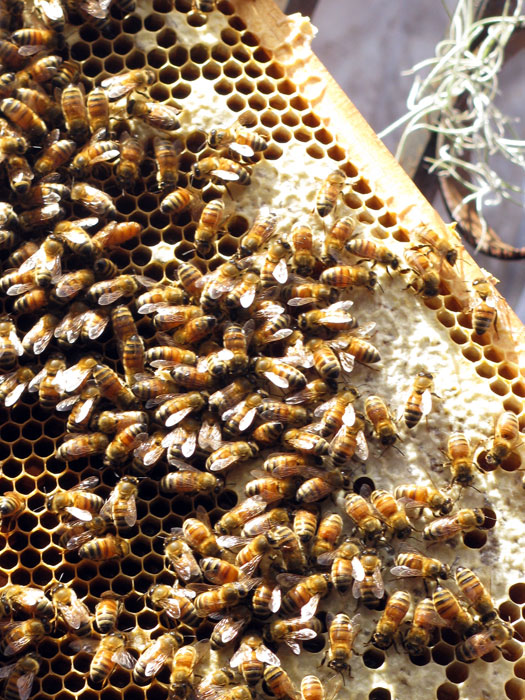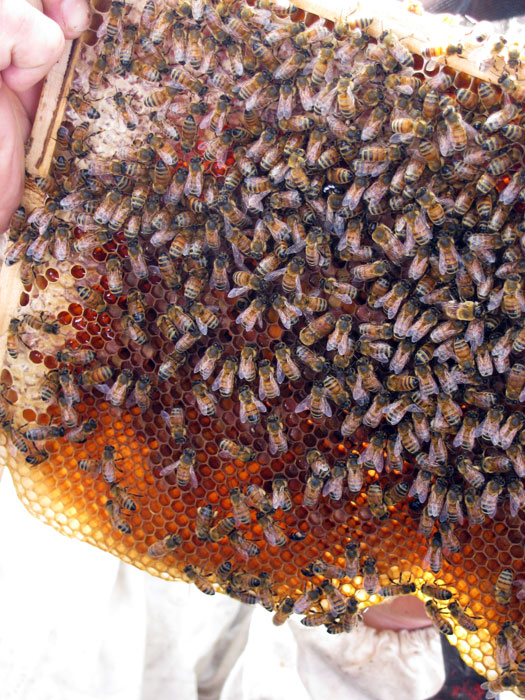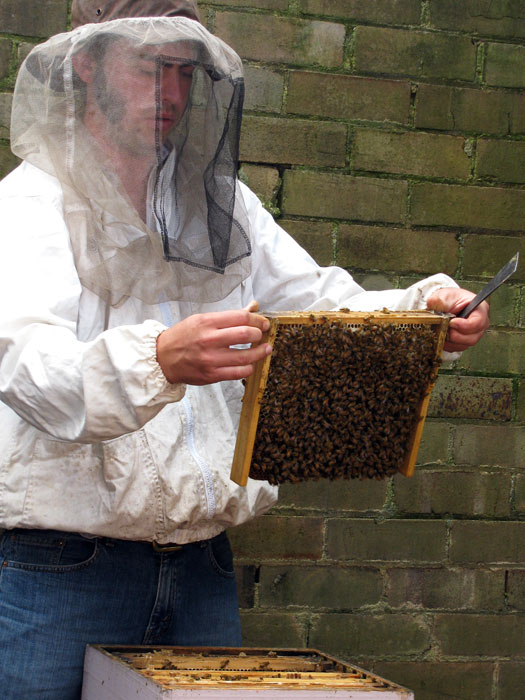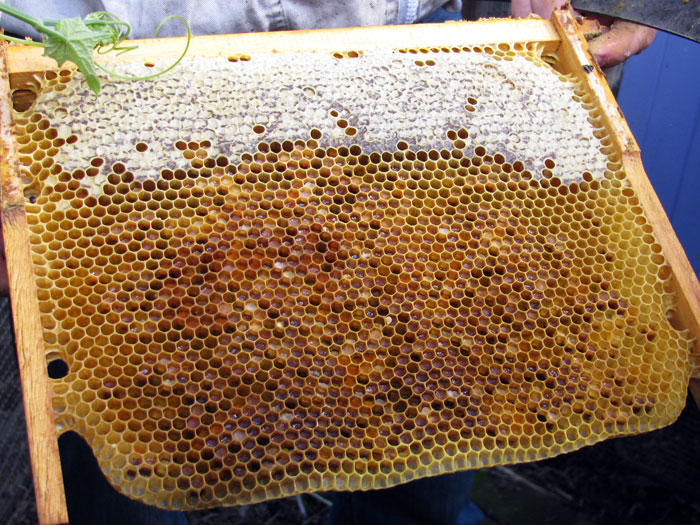Did you know beekeepers are called ‘apiarists’? I think that’s such a great name.
Two weeks ago I headed up to Sydney to attend a course on Natural Beekeeping run by Milkwood Permaculture and taught by Tim Malfroy of Malfroy’s Gold.
We’ve had the good fortune to eat some honeycomb from Malfroy’s Gold before (can I just say how AWESOME it was, by the way) and so when Bron told me about this course occurring, it was something along the lines of “it’s a beekeeping course! And it’s by the guy from Malfroy’s Gold who makes that awesome honey! We HAVE to do it!” I mean, when someone makes honey that good, you know they’re going to teach you something special, right?
The only remaining discussion was about which of us was going to attend, which largely came down to which of us would retain the taught information long enough to come home and talk the other’s ear off. Apparently I’m better at that, so off I went. :)
I’ll also be clear that I went in knowing virtually nothing — about bees, or about honey. I knew bees were cool, and I knew that they make honey, and that was pretty much it. We liked the idea of keeping bees, and I figured, if I did any research, it’d just skew my viewpoint. I wanted to go in like a sponge and just soak up all the knowledge.

So,
yeah. All the stuff that Tim taught me? Mind totally blown. I had no
freaking clue that bees are SO COOL. You should go and read up a bunch
of stuff about bees, because WOW. They are seriously the most amazing
little buggers in the world, and I feel so humble in comparison.
We learnt so much about bees themselves, and their characteristics, and bee colonies, and why we need to think of a bee colony as a “super organism” rather than considering the bees as individual insects. Tim stressed that a lot during the course, and it makes a lot of sense, considering the way that the hive works together for a unified goal. I loved learning about all the things bees are capable of, and I think it was important to give us a proper sense of them of as living, breathing creatures, that deserve our respect and our awe when working with them, rather than just a tool or a means to an end.
We also learnt tons about the history of beekeeping, and we learnt about what are currently the most common beekeeping practices in Australia, and the merits and shortcomings of these, along with the alternate, more natural style of beekeeping that Tim has been actively working with over the last 6 or 7 years. Standard practices optimize honey production and the convenience of the beekeeper (fair enough if that’s your goal) but Tim is more interested in beekeeping practices that focus on creating as natural as possible an environment for the bees, and allowing them to fully express their “bee-ness”. (I love that. Bee-ness!) So the bulk of what we learnt was focusing on that.
Everything Tim talked about regarding these practices really rang true with me, and all of it is in line with a lot of other things that we’ve been learning over the last couple of years — including our focus on ancestral diet (foods that are naturally most healthy and nutrient dense as well as sustainable for the planet, rather than foods born of convenience and commercialisation), on permaculture (working with the land for long-term sustainability, rather than short-term convenience and agribusiness profit), and even on barefoot hoof trimming (recreating natural conditions for horses instead of what’s most convenient for horse owners). Like with these, the idea is about what is most natural and optimal, what is sustainable, and what’s best for everyone and everything in the long-term (including the bees, and the plants they pollinate, and the land around them) instead of just the immediate wants of the human(s) involved. And not surprisingly, it seems as though returning to what is most natural for the bees themselves is the best idea, even if it means a bit less honey production. (And considering the amount of honey you can apparently harvest in Australia, I’m hardly worried about being short of honey!)

The
course was two days long, from 9am to 5pm both days, so there was a LOT
of learning, and a lot of information to take in and digest over a very
short period. I concentrated hard and took a lot of notes and I’m still
not sure I’ve remembered everything I wanted to. I spent three hours
talking Bron’s ear off when I got home and barely touched on what we
learnt; I could hardly do the course material justice in a single blog
post, either! But wow. I am so, so glad that I went, and I cannot tell
you how excited I am about the idea of bees now!! And not just for the
honey — bees are fantastic in so many ways. I’m actually more excited
than anything about the idea of sitting outside and just watching the
bees foraging every day.
Also, Tim was a really effective lecturer, and that really made everything so much easier. I’ve had a lot of lecturers in my life, and I’ve really learnt the difference between good ones and bad ones. A bad lecturer can kill a fascinating topic, but a good one can capture your interest in even a boring topic. Well, Tim was working with a pretty awesome topic, but he’s also good at it, and that really made a difference. He’s truly passionate about everything he’s teaching, in a way that’s incredibly infectious; he imbues you with his passion for bees. He explains things clearly yet succinctly. And he knows how to inject humour and fun into his lecturing, which is so important; when you laugh, you learn better!
As an added bonus, we got to visit a nearby apiary of a lovely lady who had taken the course several years ago and now has four (!) hives of her own. Tim opened up each of the hives and showed us the bees, and the combs they’ve been building. And because he’s apparently awesome, he managed to find and show us three of the four queens with very little effort. (Imagine how hard that is in a hive with maybe 40,000 bees in it!) It was so cool to see the bees and their hives up close, coming directly on the heels of all that we’d learnt about them, and it really cemented for me that this was something I really want to do. So I’m super glad that we were able to be hands-on like that (even if we didn’t handle any bees or combs ourselves) with the course material still fresh in our minds.

So
yeah. OMFG BEES. I’m talking to Tim about getting some of his really
cool Warré hives, and I’m going to start to talk to some local
beekeepers to take advantage of local knowledge, and do tons more
research. And hopefully in the spring we’ll have the luck to find us a
local swarm and get some bees on the property. I’m really excited! I
don’t know how it’ll all go and I’m sure there’ll be all sorts of WTF
moments, but we’re pretty good at chucking ourselves in the deep end and
figuring out that we can swim after all. Trying new things and learning
new things is the most important part of this journey, I think!
And I do so want an excuse to be able to call myself an ‘apiarist’.


